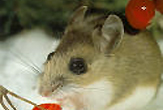Winter Shrinks Mice Brains

Winter challenges animals to conserve energy or perish. One species of mice has a novel approach: Their brains shrink.
In a new study, scientists trained white-footed mice to find an escape platform hidden just below the surface of opaque water in a maze. Then they artificially shortened the day to simulate winter. The mice took longer to find the platform and took longer to remember its location on subsequent days.
"The brain uses a lot of energy relative to its weight," Randy Nelson, a co-author of the study and professor of psychology and neuroscience at Ohio State University. "Like many mammals, mice need to reduce their energy costs during winter, and the brain is a good place to do that."
Further research into the phenomenon could one day help scientists learn more about seasonal depression in humans, Nelson said. The hormone melatonin, also found in humans, may control the change, Nelson and his colleagues believe. Scientists know that melatonin levels are related to seasonal changes in daylight.
The mice in artificial winter had on average a smaller brain mass compared, even when taking into account their reduced body weight. In particular, the hippocampus, an area of the brain involved in spatial memory, shrunk.
Here's the likely logic: During winter, mice don't roam as much and so don't need as much spatial memory.
Other parts of the rodent brains -- sensory abilities, nonspatial memory and learning -- don't change with winter.
Sign up for the Live Science daily newsletter now
Get the world’s most fascinating discoveries delivered straight to your inbox.
The study was detailed in the May 4 issue of the Journal of Neuroscience.
Related Stories
- Chronic Pain Shrinks People's Brains
- Study: Your Brain Works Like the Internet
- Mouse With Human Brain May Live
- Making Bigger Brains











